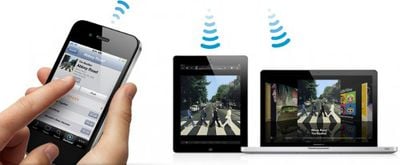Many readers were perplexed by the lack of an iTunes streaming music service at yesterday's WWDC keynote. Apple instead launched iTunes Match -- a service that allows users to get the same "download anywhere" benefits from songs they have ripped from CD's (or, ahem, *acquired* from other sources) as songs they have purchased from the iTunes Music Store.

As All Things Digital's Peter Kafka put it:
Apple will take the songs you've stolen, and turn them into legit files, with big music's blessing.
Awesome. But, users still have to download songs to their iDevices, and if you have a ton of music, that can be a pain. Many observers expected iCloud would include a music streaming service, a la Lala -- but it didn't. Why?
Because it would have killed the carriers. Erica Naone writes in the Technology Review:
A streaming version of iTunes could have hugely increased the amount of data that carriers would be expected to carry. The largest carriers in the U.S., AT&T and Verizon, both cancelled their unlimited plan in June 2010. T-Mobile and Sprint both still offer unlimited plans. Today, T-Mobile says, the average 4G smart-phone user consumes about a gigabyte of data per month. That number could change significantly if a popular service like iTunes truly moved to the cloud.
With Apple selling nearly 20 million iPhones per quarter, launching a major streaming music platform that every iPhone user would instantly start using would quite literally overload the carriers. It would be like Manhattan or San Francisco, only everywhere. And what's the point of a streaming music service if you can't get a signal?























Top Rated Comments
"Everyone" doesn't stream Pandora or Napster by any stretch of the imagination. Maybe 5 or 10 percent of iPhone users? Put streaming audio in the bundled apps and that probably jumps to 90%.
There's a difference between allowing something that's data heavy but only used by a few power users and making something that's data heavy a prominent feature.
Not just music, apps and particularly movies (which can be HD) can eat up that space quickly.
Mobile carriers, not ISPs. You won't stream Netflix over 3G like you would your music. Streaming videos over 3G is a painful, horrible experience, while with much less bandwidth you can get perfect audio quality, therefore you'd be streaming gigabytes of music per month instead of that one time you tried to watch a TV show over 3G.
Think about it; AT&T already bitches enough having to carry only a few kilobits per second per phone. Imagine if that jumped to a few hundred kilobits per second per phone because Apple saw fit to enable iTunes streaming.
At least the labels will get something for that pirated music.
And will get a little something more for legally ripped music. :)
As to why they didn't offer it Wi-Fi only? That I can't answer.
What if the music was lossless?
Obviously not...and in no way did my comment suggest that. :cool: